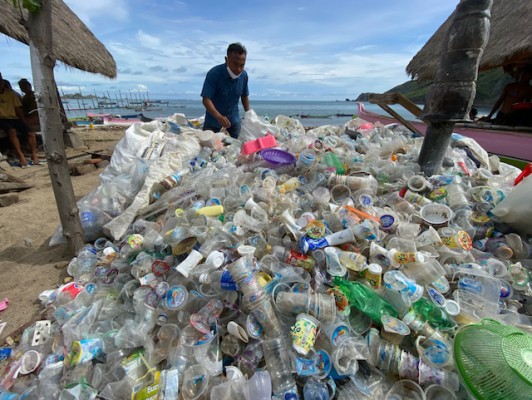To coincide with World Ocean Day, Aldi and Waitrose have announced similar initiatives as part of their drives to tackle plastic waste.
 Aldi is introducing packaging made with Prevented Ocean Plastic (POP) across its entire range of own-label fishcakes and crispbakes.
Aldi is introducing packaging made with Prevented Ocean Plastic (POP) across its entire range of own-label fishcakes and crispbakes.
The packaging, produced by Sharpak, part of Groupe Guillin, includes traceable and certified recycled waste plastic that has been collected by communities living in coastal areas across the globe at risk of ocean plastic pollution.
The change is expected to prevent approximately 76 tonnes of plastic from entering the ocean each year – the equivalent of over 3m plastic bottles – as well as supporting the bottle collectors, collection centres and local recycling facilities.
Aldi has also significantly reduced the size of its fishcake packaging, which will see the removal of a further 32 tonnes of plastic annually, as well as 23 tonnes of cardboard from its Specially Selected lines.
Last year, Aldi pledged to halve the volume of plastic packaging it uses by 2025.
Richard Gorman, Plastics and Packaging Director at Aldi UK, said: “These changes will see us use less packaging overall, and also repurpose plastic that could otherwise end up polluting our oceans.
“This is the latest in a series of initiatives we are rolling out to reduce our environmental impact and offer our customers even more environmentally sustainable options when they shop at Aldi.”
Meanwhile, Waitrose has also pledged to use more POP in its own-label packaging, with over 100 tonnes estimated to be used this year – the equivalent of saving almost 4 million plastic bottles from the ocean.
As well as using POP in packaging for 13 lines across its ready meal range, due to launch later this year, Waitrose is also using it more widely across a broad range of its own-label packaging, supplied by Sharpak, including fruit, veg, family and health, with others to follow.
Waitrose is working toward its commitment for a minimum of 30% recycled content in plastics, using POP where possible. All of the plastic tray packaging across its own-label fruit is already composed of 80% or more recycled content.
Marija Rompani, director of ethics & sustainability at the John Lewis Partnership, commented: “It’s estimated that 90% of the plastic in our oceans comes from just 10 rivers around the world, with coastal regions in Southeast Asia identified as being at particular risk.
“Our customers have told us they want to see more packaging made from recycled content on our shelves and with vast amounts of plastic already in the world, we are committed to repurposing where we can and using more sustainable options. There is more to do but we hope that by using more Prevented Ocean Plastics in our packaging, we can be part of the solution to this hugely significant global issue.”




